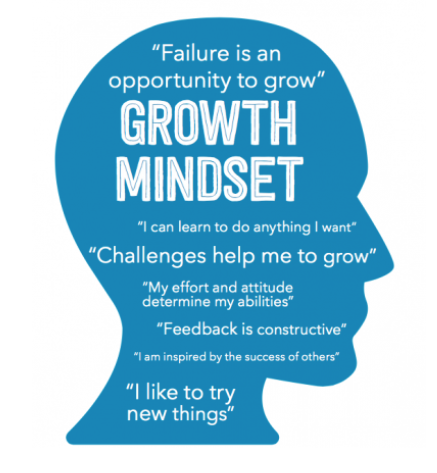I can do all this through him who gives me strength.
- Philippians 4:13
Developing a growth mindset is a powerful tool for encouraging students' learning potential. Growth Mindset is a concept that was devised by psychologist Carol Dweck. A growth mindset highlights the belief that intelligence and abilities can be developed through hard work and practice. For secondary students, navigating the challenges of school can be daunting, but if they can cultivate a growth mindset, they can build resilience, motivation, and ultimately, academic success.
What is Growth Mindset?
Having a growth mindset lies in the understanding that failures and setbacks are not signs of your limitations but rather, they are opportunities for growth. This shift in perspective enables students to embrace challenges, persist when facing obstacles, and view criticism as constructive feedback rather than personal attacks. Research by Dweck has demonstrated that individuals with a growth mindset are more likely to exhibit adaptive learning behaviours, such as seeking help when needed, employing effective study strategies, and viewing the learning process as a journey.
Four considerations for developing a Growth Mindset
Cultivating Self-awareness: Encouraging students to reflect on their beliefs about intelligence and abilities is the first step toward cultivating a growth mindset. By fostering an environment where students feel safe to explore their strengths and needs, parents and teachers can help them recognise that their potential is not fixed but flexible.
Promoting Effort and Persistence: Effort is the pathway to mastery, and promoting a culture of persistence is essential in fostering a growth mindset. Parents and teachers can celebrate students' resilience and progress, emphasizing that setbacks are temporary and serve as opportunities for learning and growth.
Encouraging Risk-taking and Embracing Challenges: Research shows that for intellectual growth to occur, we need to step outside our comfort zone. Encouraging students to take risks, try new approaches, and tackle challenging tasks promotes a sense of resilience and flexibility. By looking at failures as valuable learning experiences, we can learn to persevere and develop the confidence to confront future challenges.
Providing Constructive Feedback: Feedback plays a pivotal role in shaping students' perceptions of their abilities. When delivered thoughtfully and constructively, feedback reinforces the idea that improvement is attainable through effort and strategy. Parents and teachers need to highlight specific areas for improvement while also highlighting students' progress and achievements, creating a supportive feedback loop that reinforces a growth mindset.
Four ways to apply a Growth Mindset in your learning
Setting Goals: Goal setting is a fundamental aspect of academic success. We need to encourage students to set specific, achievable goals that focus on personal growth and development. Breaking down larger goals into manageable tasks can enable students to take ownership of their learning journey.
Study Strategies: Assisting students to develop effective study strategies enhances their capacity to learn and retain information. Encourage students to adapt their study methods based on teacher feedback, reinforcing the idea that learning is a dynamic process that requires experimentation and refinement.
Seeking Support and Collaboration: Collaboration fosters a sense of community, and provides opportunities for peer learning and support. Encourage students to seek help from you, their teachers, and their peers. Put emphasis on the value of constructive collaboration, where diverse perspectives and ideas contribute to collective growth and understanding.
Embracing Continuous Improvement: Learning is an ongoing journey characterised by growth and development. Encourage students to adopt a mindset of continuous improvement, where each task, whether successful or not, serves as a stepping stone toward mastery. Celebrate progress and achievements while emphasising that there is always room for growth and refinement.
Traditionally in the educational landscape, success is often compared with natural talent or intelligence. In today’s educational landscape, fostering a growth mindset among secondary students is crucial. By instilling beliefs in the power of resilience, and continuous learning, parents and teachers can empower students to navigate challenges with confidence and determination. Through self-awareness, perseverance, and a commitment to growth, secondary students can unlock their full potential and thrive in their academic endeavours.
As a school, working in partnership with our families is very important. We encourage our staff to foster a growth mindset in their classrooms when interacting with students. How can you, as a parent or carer, foster a growth mindset in the home?
Drew Roberts - Head of Secondary

